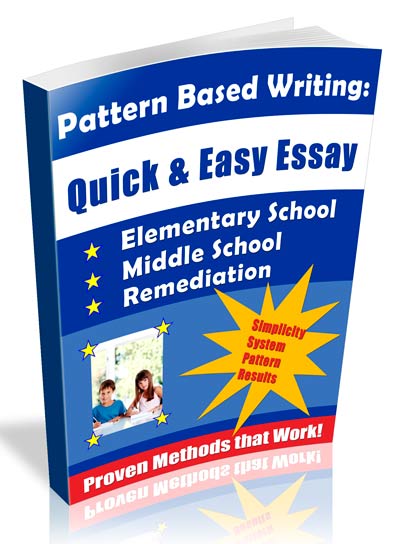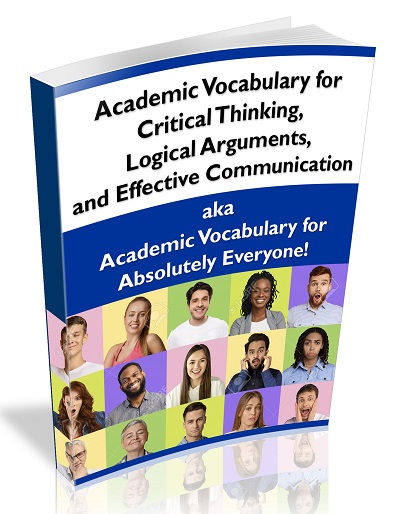It’s critical to review and familiarize your students with writing prompt keywords and structure before a state or district writing assessment. We aim to prevent our students from freezing like deer in headlights.
Most writing prompts across all 50 states look much alike. They have a similar structure, use similar language, and involve similar situations. While it’s true that writing prompts do change across grade levels, it’s also true that fourth-grade writing prompts look quite similar to high school writing prompts. In fact, the high school “writing situation” may be the same as the elementary school, but with more complex language and writing requirements.
After learning some tips and tricks regarding the writing prompts found on state and district writing assessments, be sure to download over 114 pages of Released Writing Prompts for State Writing Assessments here. Also, if you want to bring about true writing success for elementary students or struggling middle school writers, check out Pattern Based Writing: Quick & Easy Essay.
State writing assessments usually ask for one of these eight types of writing:
1. Narrative: A realistic story or an imaginative story.
2. Expository: Explain + Inform = Expository
3. Persuasive: This is expository writing with an agenda.
4. Inform: The facts… just the facts!
5. Imaginative: This is actually a narrative.
6. Descriptive: Descriptive writing tasks are less common than the other types of writing.
7. Summarize: Read a passage and then summarize what you have read.
8. Respond to Literature: Read a passage and then answer the question using evidence from the text. This kind of writing is usually a little bit expository and a little bit persuasive.
Note: In the collections of released writing prompts mentioned above, there are a few examples of prompts for “Summarize” and “Respond to Literature.” As such, I provide some samples of these prompts at the bottom of this page.
Writing Prompt Length and Structure
Most state writing prompts will be two or three sentences. This is especially true in elementary school. Even though the prompts are short, they are often written in multi-paragraph form. Each sentence is written in a separate paragraph. In other words, each sentence is written on a separate line.
Naturally, the writing tasks’ wording and requirements get a little more complex with each grade. That being said, teachers can use most prompts across many different grades with only slight modifications to the language of the prompt.
The Two Parts of the Writing Prompt
Most writing prompts contain two parts. These two parts are:
1. The Writing Situation: The writing situation gives a little background on the topic that students will be writing about. Example: Many people own pets.
2. The Writing Task: The writing task contains the specific directions. These directions often include keywords that identify the “mode of writing” being asked for. Example: Write a persuasive essay convincing your principal to extend recess time.
Some states have short 1-2 sentence prompts, while others have longer 5-8 sentence prompts. Here is a fourth-grade writing prompt from the Kentucky state writing assessment. It is six sentences, which is quite long for a fourth-grade writing prompt. Kentucky seems to have longer prompts than most states. Note: Even in high school, few writing prompts are longer than 6-8 sentences.
Example: Kentucky – 4th Grade Writing Prompt (6 sentences)
Writing Situation: The local newspaper is having a “Good Friend” contest. To enter your friend, you must think of an event in your life when your friend did something with you or for you that showed what a terrific friend he or she is.
Writing Task: Select your friend. (Remember, a friend could be a child your age or a grownup.) Choose an event that shows how your friend is a good friend to you. Write a letter to the newspaper that tells about that event so that people will know why your friend deserves to win.
Keywords for Writing Prompts
As mentioned, most writing prompts use a similar structure and language. As such, some types of words will be found in most writing prompts. These words are almost always performing the same job. For example, if you see the word “principal” in a writing prompt, you can be 99% sure it will be a persuasive writing task.
Keywords are often used to trick students, so don’t read too much into them. However, at least one of the keywords below will be found in almost every prompt. It is worthwhile to point out these types of words and phrases and have students learn to spot them.
Writing Situation Keywords
1. Imagine one day (Narrative)
2. Imagine that (Narrative)
3. Imagine you have (Narrative)
4. Think about (Narrative or Expository)
5. Think of someone (Inform or Expository)
6. Think of a time (Narrative)
7. What is your favorite (Expository)
8. Your school principal is considering (Persuasive)
9. Your school has some (Persuasive)
10. Your school is (Persuasive)
11. It is important that people (Persuasive)
12. Sometimes classrooms (Narrative or Expository)
13. You suddenly realize (Narrative)
14. Pretend that (Narrative)
15. Have you ever (Narrative)
16. Everyone has a favorite (Inform or Persuasive)
17. Your school newspaper is (Persuasive)
18. Your parents want to (Persuasive)
19. If you could be (Narrative or Expository)
20. Select a (Inform)
21. Identify a (Inform)
22. Most people (Inform)
23. Many public places do not permit (Persuasive)
24. Do you agree or disagree? (Persuasive)
25. Suppose that you (Narrative)
26. Most students have a (Expository)
27. Everyone enjoys (Expository)
28. Think about the kinds (Inform)
29. You have been named (Narrative)
30. Your principal (Persuasive)
31. The students at your school (Persuasive)
32. Based on the story (Respond to Literature)
Writing Task / Writing Directions Keywords
1. Write a story (Narrative)
2. Describe it (Descriptive)
3. Your assignment is
4. Write about this person (Inform or Expository)
5. Write to explain why (Expository)
6. Explain what animal (Expository)
7. Make up a story (Narrative)
8. Tell a true story (Narrative)
9. Explain the (Expository)
10. Write an article for (Inform or Expository)
11. Write a persuasive letter (Persuasive)
12. Write a narrative about (Narrative)
13. Write to persuade your classmates (Persuasive)
14. Write a letter to (Persuasive)
15. Write a persuasive essay (Persuasive)
16. Write a speech to convince (Persuasive)
17. Urge your readers (Persuasive)
18. From your own experience, tell about (Narrative)
Intended Complexity and Confusion in Writing Prompts
Memorizing keywords is rarely a good use of time. State tests are usually sophisticated enough to discourage these types of shortcuts. For example, narrative writing prompts often use the word “imagine.” However, many other prompts also use that word to set up the situation.
Example: Imagine you have just been elected class president. Write a letter to your fellow students urging them to keep the schoolyard clean.
This example shows a persuasive writing task yet uses the word “imagine” in describing the writing situation. Many students associate the word “imagine” with a story. One can be sure the wording is no accident.
Another monkey wrench thrown at students is that writing assessments often require students to write for a transactive purpose. A transactive purpose is authentic writing with a real-world purpose.
For example, many state writing tests require students to write a letter to someone or write an article for the school newspaper. Note: The prompt above asks students to write a persuasive letter. Many teachers may teach letter writing, and they may teach persuasive writing; however, it never occurred to them to have students write a persuasive letter. Of course, it shouldn’t make a difference, yet it does. Transactive purpose!
Response to Literature and Summarize Writing Prompts
As promised, here are a few examples of “respond to literature” and “summarize” writing prompts. Be sure to download over 114 pages of Released Writing Prompts for State Writing Assessments here. Once again, you won’t find many examples of “respond to literature” and “summarize” writing prompts even in those 114 pages.
Respond to Literature Prompts
Here are three examples:
1) Read the story. What lesson does the author want the reader to learn? Be sure to use specific examples from the passage to support your answer.
2) Based on the story “When the Tiger Comes Home to Roost,” how can the reader tell that life in the jungle is dangerous? Use specific examples from the passage to support your answer.
3) Do you think “The Most Important Question” is a good title for this story? Why or why not? Use details from the story to support your answer.
Write a Summary Prompt
Here is one example of a summary prompt.
Write a summary of the article. Be sure to:
- state the main idea or ideas of the article
- tell the important details that support the main idea
- use your own words when writing your summary.
If you want your students to be prepared for your state and district writing assessments, check out Pattern Based Writing: Quick & Easy Essay!
Which Are the Most Important and Common Writing Prompt Keywords? Note: I Counted Them!
To be clear, I teach a robust academic vocabulary using Academic Vocabulary for Critical Thinking, Logical Arguments, and Effective Communication, aka Academic Vocabulary for Absolutely Everyone! Over the years, I’ve found that teaching many words that create academic success is more effective than teaching what I think might be on the test.
Still, it behooves teachers to master the structure and keywords found in writing prompts. Which are the most important writing prompt keywords? The answer may surprise you! In fact, I did a word count on over 114 pages of Released Writing Prompts for State Writing Assessments and the answer did surprise me.
Here is what I discovered. And yes, the number in parentheses is the number of times the keyword appeared in the writing prompts. The higher the number in parentheses, the more common the word.
The Most Common Writing Prompt Keywords
what (232), how (125), why (179), when (78), explain (138), example (49), reason (34), specific (40), support (61), think about (104), tell (62), details (71)
Rare Writing Prompt Keywords
evaluate (0), justify (0), analyze (0), compare (1), contrast (0), examine (0), fact (1), statistic (0), illustrate (0), summarize (0), respond (2), interpret (0), interpretation (1), evidence (2), prove (0), proof (0), review (0), define (0), solution (1), clarify (0), elaborate (0), concrete (0), relevant (0)
Writing Prompt Genre Keywords
article (17), letter (27), essay (97), report (3), story (116), speech (9), response to literature, etc.
All the Writing Prompt Keywords I Counted
who (39), what (232), where (32), why (179), when (78), how (125), understand (40), understand why (12), help your (17), explain why (30), tell why (13), example (49), evaluate (0), justify (0), analyze (0), explain (138), compare (1), contrast (0), examine (0), identify (14), position (15), quote (2), describe (12), reason (34), fact (1), statistic (0), think about (104), illustrate (0), discuss (2), sensory detail (10), senses (5), summarize (0), summary (7), respond (2), details (71), detail (14), imagine (26), interpret (0), interpretation (1), specific (40), evidence (2), persuade (42), experience (50), audience (28), relate (2), prove (0), proof (0), decide (21), review (0), support (61), define (0), opinion (11), problem (14), solution (1), clarify (0), elaborate (0), concrete (0), event (36), relevant (0), tell (62)




